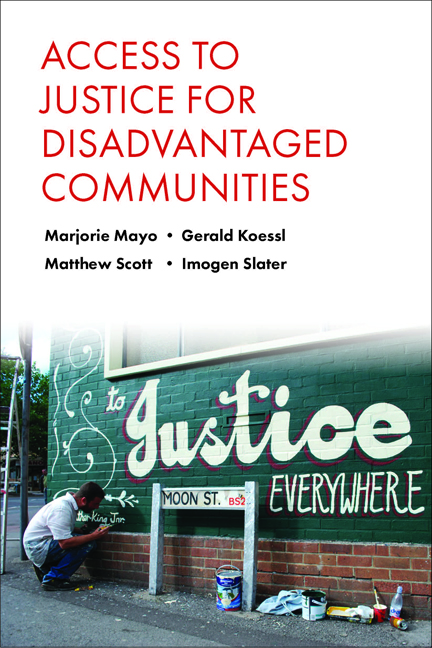Book contents
- Frontmatter
- Dedication
- Contents
- Acknowledgements
- Abbreviations and glossary
- Introduction: accessing social justice in disadvantaged communities
- one Social justice and the welfare state
- two Concepts of justice and access to justice
- three Ethos and values
- four Challenges and dilemmas
- five Public service modernisation, restructuring and recommodification
- six Conflict and competition versus collaboration and planning
- seven Public service modernisation and time
- eight Alienation and demoralisation, or continuing labours of love?
- nine Access to social justice for disadvantaged communities: value and values
- Appendix 1 Research methodology and questionnaire
- Appendix 2 Law Centres included
- Appendix 3 Topic guides for semi-structured interviews
- References
- Index
four - Challenges and dilemmas
Published online by Cambridge University Press: 01 February 2022
- Frontmatter
- Dedication
- Contents
- Acknowledgements
- Abbreviations and glossary
- Introduction: accessing social justice in disadvantaged communities
- one Social justice and the welfare state
- two Concepts of justice and access to justice
- three Ethos and values
- four Challenges and dilemmas
- five Public service modernisation, restructuring and recommodification
- six Conflict and competition versus collaboration and planning
- seven Public service modernisation and time
- eight Alienation and demoralisation, or continuing labours of love?
- nine Access to social justice for disadvantaged communities: value and values
- Appendix 1 Research methodology and questionnaire
- Appendix 2 Law Centres included
- Appendix 3 Topic guides for semi-structured interviews
- References
- Index
Summary
The previous chapter described Law Centres, their ethos and values, setting the context for the discussion of the impact of the Carter reforms to legal aid. As Chapter Two has already illustrated, these reforms were the subject of considerable debate when they were first proposed. Critics predicted that the results would be damaging in a number of ways, potentially undermining poor people's access to justice and posing challenges and dilemmas for those engaged in providing legal aid services. This chapter starts by summarising some of the evidence that has emerged as the reforms have been implemented. This sets the context for considering the impact on Law Centres more specifically. How did their staff and volunteers experience these changes, what challenges were posed and what dilemmas emerged? As the final section of this chapter points out, while the Carter reforms were initially the major focus of concern, subsequent proposals for legislative changes to legal aid became a more immediate focus, and posed threats to much of legal aid funding. Later chapters explore in further detail the challenges and dilemmas that were exacerbated as a result of the changes.
Recent research findings
Research studies on the impact and meaning of changes to the provision of legal aid since the early 1990s have argued that the results have been ‘an irresistible pressure towards routine, poor quality justice’ (Sommerlad, 2008, p 179) and that opposition to the reforms was ‘pilloried as the product of either self-interest or naivety’ (Sommerlad, 2008, p 182). While claims of self-interest may have some validity, what Sommerlad argued was that the reforms were undermining relationships based upon reciprocity and trust, substituting these for social relations that ‘entailed the micro regulation of the legal aid practitioner’ (Sommerlad, 2008, p 183). The end result was that professional autonomy was undermined and increasing gulfs emerged between corporate firms, on the one hand, and those undertaking legal aid work, on the other, mirroring the inequalities in their client bases and, hence, in society at large (Sommerlad, 2008).
The focus upon competition and entrepreneurialism had perverse effects, potentially reducing the supply of quality services for clients, it was argued. “[T]he margins are so tight … and there are constant changes”, a senior partner commented, “you just get exhausted”. In his view, this distracted from building up a business plan, which was “a farce anyway because the goal posts are moved and moved and moved”.
- Type
- Chapter
- Information
- Access to Justice for Disadvantaged Communities , pp. 51 - 60Publisher: Bristol University PressPrint publication year: 2014



